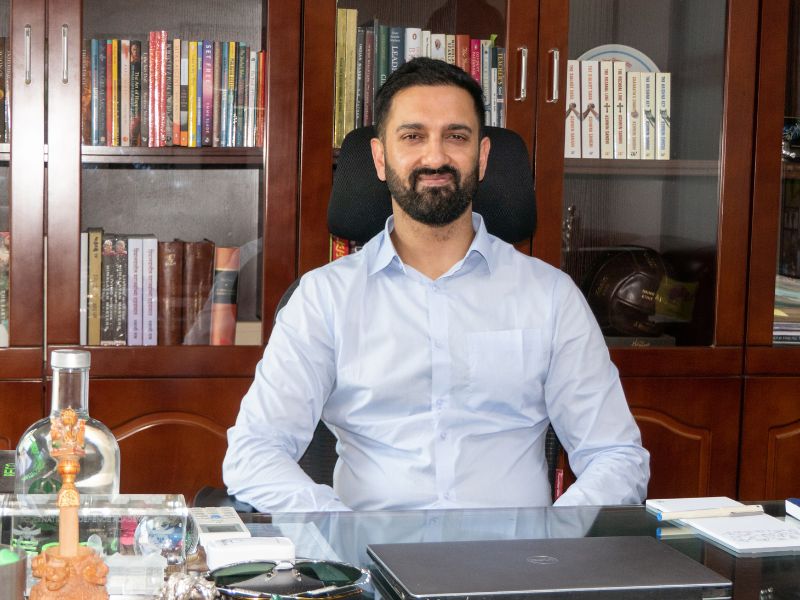Transforming parents into partners in children’s overall growth
Praneet Mungali, an educationist and Trustee of the Sanskriti Group of Schools
Parents and educators share a common goal: to equip children with the tools necessary for a fulfilling and successful life. This extends beyond academic achievement and calls for a holistic approach that nurtures a range of essential skills to help children navigate the complexities of the real world. These skills not only pave the way for career success but also empower individuals to live lives of purpose and meaning.
Broadly, these essential competencies fall into three categories: academic skills, social-emotional skills, and life skills. Neither schools nor parents can foster these in isolation. The most effective approach is a collaborative one—where both educators and parents recognise their shared responsibility in shaping a child’s development. While academic growth largely rests within the school’s domain, cultivating life skills requires a sustained, joint effort. Let us delve deeper into the life skills crucial for holistic development.
Social-Emotional Skills
An influential 80-year-long Harvard study on adult development, begun in 1938, revealed that long-term happiness is not rooted in wealth or professional success, but in the quality of close, meaningful relationships. This highlights the importance of helping children build and maintain strong connections from an early age.
In urban settings—where joint families are rare and both parents often work—children may spend a significant amount of time alone. Simple family rituals such as sharing meals or establishing screen-free time can provide valuable space for conversation and emotional bonding. These consistent habits, modelled at home, create a foundation for meaningful relationships and foster emotional security.
An equally important ritual is cultivating healthy technology habits. In today’s digital age, many children grow up without experiencing life before screens. Like sugar, technology can be addictive: appealing in the short term, but potentially harmful when overused.
Since most screen time occurs at home, parents must actively guide its use. Technology can be a powerful tool for learning or occasional entertainment, but it should never replace genuine human connection. Adults must lead by example—limiting their own screen use, prioritising face-to-face interaction, and setting aside gadget-free time as a family. These small, consistent actions help children develop a more balanced and mindful relationship with technology.
Social Skills
Psychological research underscores the importance of social fitness—the capacity to navigate relationships and manage the emotional ups and downs they involve. Like physical and mental fitness, social fitness is a crucial life skill. Humans are inherently emotional beings, and managing relationships requires empathy, flexibility, and emotional intelligence.
Children benefit greatly from exposure to diverse social environments—interacting with individuals from various age groups, cultures, and backgrounds. These experiences equip them with the skills to relate, collaborate, and communicate effectively. Here, parents play a pivotal role in acknowledging that every child is different: while some may be naturally outgoing, others are more reserved. Regardless of temperament, all children benefit from intentional support and practice. Just as one would adopt a fitness regimen to strengthen the body, developing social resilience involves recognising life’s emotional ebbs and flows and engaging meaningfully with others.
Healthy Habits and Physical Fitness
Nutritional habits and physical activity form the foundation of a child’s overall well-being. The modern diet—often high in sugar and processed foods—has contributed to growing health concerns such as childhood obesity and juvenile diabetes. Initiatives like CBSE’s Sugar Board mark a step in the right direction, but schools alone cannot effect lasting change. Much of a child’s eating and activity habits are shaped at home.
Parents must champion balanced nutrition and active lifestyles. Even if children do not pursue sports long-term, establishing a culture of movement and healthy eating early in life sets the stage for long-term wellness. As Swami Vivekananda aptly said, “It is impossible for a healthy mind to reside in an unhealthy body.” Habits such as regular outdoor play, physical activity, and nutritious meals must be introduced at home and reinforced consistently.
Building Grit and Resilience
In a world defined by rapid technological advancement and uncertainty, resilience and grit have become invaluable qualities. As professions evolve—or disappear—children will need more than knowledge to succeed. They will need the emotional strength to adapt, learn continuously, and bounce back from setbacks.
Parents and schools must work together to nurture this mindset. One of the most effective strategies is to allow children the freedom to make decisions—even if this means they occasionally fail. Encouraging healthy risk-taking, paired with emotional support when things go wrong, teaches children that failure is not a dead-end but part of the learning journey. These experiences become emotional ‘shock absorbers’—equipping children to cope with change and uncertainty with confidence.
The Path Forward: Partnership in Action
Ultimately, raising children who are not only successful but also fulfilled is a shared responsibility. Academics matter, but they are only one part of the larger puzzle. Life skills—such as emotional awareness, physical well-being, adaptability, and relationship-building—are equally critical.
We must teach children to care for their physical and emotional health, to use technology wisely, and to value real-world relationships. They must understand that risk-taking and occasional failure are essential to growth. These lessons are best taught when schools and parents work hand in hand—united by a common vision of nurturing character, connection, and curiosity alongside cognitive development.
Also Read: How India’s first-gen learners are breaking barriers through education
















Add comment